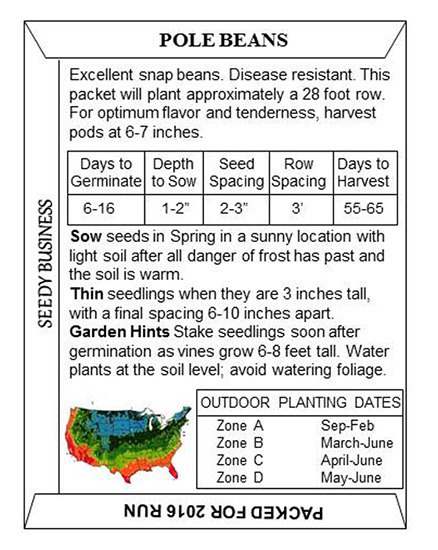Whether you are new to vegetable gardening or a long-time gardener, planting seeds in the ground is a gratifying experience, marking the end of winter and the beginning of the season of growth.
If you are shopping for seeds through a catalogue or online source, remember that the entire product line of the seed company may be represented and some of their stock might not be suited to your geographic area. Local sources are more likely to focus on varieties appropriate to local growing conditions.
Whether buying local or online, be sure to read the information on the seed packet or in the description. Pay attention to germination requirements, insect and disease resistance, heat/light requirements and “days to maturity.” Purchase varieties appropriate to your garden site.
Soil temperature affects how quickly seeds germinate in the ground; different seeds germinate and grow at different temperatures. Sow seeds when conditions are right for that particular vegetable.
Even with seeds that germinate well in cool weather, cold soil in the spring can delay germination and cause seeds to rot before they can sprout.
Pre-sprouting helps and can be done in two ways: (1) place the seeds between two damp paper towels, place the paper towels in a plastic bag and keep them in a warm place until the seeds germinate; (2) soak seeds for four hours.
After pre-sprouting, plant the seeds according to packet directions, being careful to protect the tiny new roots.
Most seed packets provide directions for planting depth and spacing. If planting depth is not specified and your soil is high in organic matter, plant seeds four to five times their width. If your soil is high in clay content, plant seeds at a depth of two to three times their width.
To make it easier for seeds to push through the soil, consider applying a band of fine compost, one-quarter inch thick and 3-4 inches wide, over the seeds. This helps to retain moisture and prevents the soil from forming a hard crust.
Plan for the “footprint” of your plant at maturity by following spacing recommendations on the seed packet. Plants that are too close together will not thrive because they are competing with each other for resources.
Many gardeners plant seeds in long rows, spaced so that the gardener can easily move between rows to tend the plants and harvest. But other approaches are possible.
In “broadcast planting,” seeds are planted in wide rows or beds. Sow seeds evenly over the planting area, rake them in and firm the soil over the seeds. Broadcast planting is faster than single row planting; however, weeding is more difficult and the young seedlings must be thinned to allow room for growth.
Vegetables with small seeds, such as lettuce, radishes and carrots, do well with broadcast planting.
“Hill” planting is actually a grouping of seeds, not planting seeds on a mound. Plant four or five seeds per “hill” and firm the soil over the seeds. After sprouting, thin to three seedlings per “hill.” Cucumbers and squash are particularly well suited to this method of planting.
Regardless of the planting approach, water your seeds after planting with a light spray to avoid disturbing them. Do not let the soil dry out — keep it moist, but not soggy for best results.
Plant sale set
Clallam County Master Gardeners host their annual Spring Plant Sale at the Demonstration Garden on 2711 Woodcock Road in Sequim from 9 a.m.-noon Saturday, May 7, and from 10 a.m.-noon Sunday, May 8.
A wide variety of plants will be available at great prices including perennials, vegetables starts and unique plants. Come early for the best selection.
Pearl of wisdom
Be sure that the seeds you purchase are fresh; they should be dated for the current year. After planting, store extra seeds in an airtight jar or other container in a cool, dry place.
With proper storage, many kinds of seeds remain viable for a year and some stay good for several years.
Judy English is a WSU-certified, Clallam County Master Gardener.



